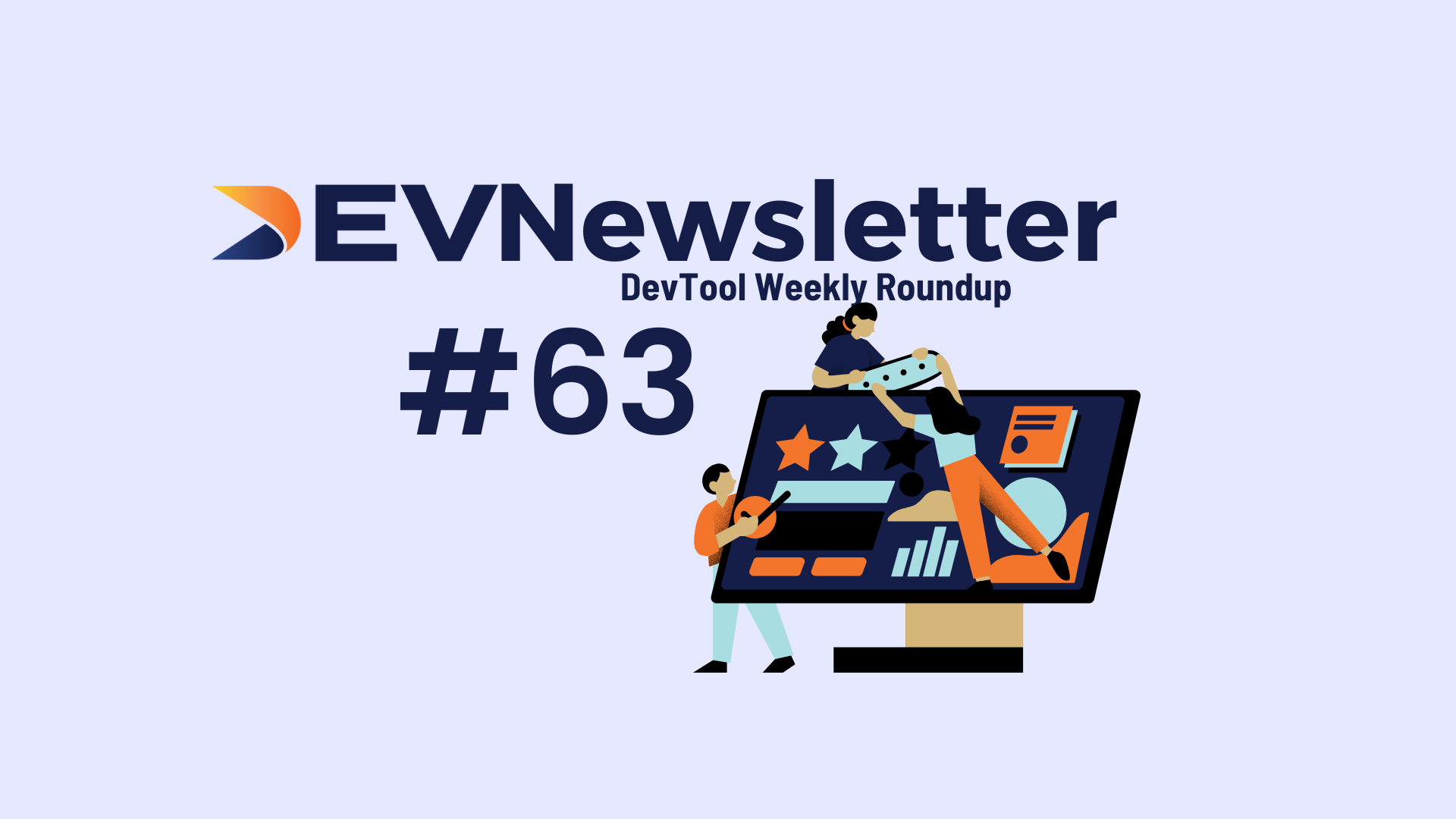We love seeing so many companies prioritizing developer experience, and this week’s news proves just that. From simplifying workflows to streamlining connectivity, these innovations are all about making life easier for developers. Whether it’s raising new funds to fuel product scaling or launching tools designed to take the pain out of complex processes, it’s clear that devtools are evolving to help teams work faster, smarter, and more securely.
Get ready for a round-up of some exciting funding wins, product launches, and standout tools that are shaping the future of development.
🏆 Funding Wins
Hotglue Powers Up with $4M Seed to Drive Open-Source Integrations
hotglue, an embedded integration platform, has secured $4M in seed funding led by 8VC, with backing from Wayfinder Ventures and Y Combinator. The company, co-founded by David M. and Hassan Syyid, helps developers integrate products and applications with open-source solutions, supporting industries like CRM, accounting, and e-commerce. With clients now spanning across the US, Europe, India, and South America, Hotglue’s tools are increasingly powering AI-focused companies. The fresh capital will fuel team expansion and product scaling to meet growing demand. Brilliant work Hotglue!
Port Anchors $35M Series B to Streamline Developer Workflows
Port IO, an internal developer portal designed to simplify engineering workflows, has raised $35M in Series B funding, led by Accel and Bessemer Venture Partners. The platform, co-founded by Zohar Einy and Yonatan Boguslavsky Port, provides developers with a centralized hub to manage cloud resources, incidents, and compliance standards. This round brings their total funding to $58M. Einy expressed enthusiasm about the company’s growth, saying, “We enable engineering to move fast without breaking things.” Port’s client list now includes major names like GitHub, LG, and British Telecom. Way to go Port!
Learn more about Port’s mission and funding here
Edgee Raises $2.9M Pre-Seed to Revolutionize Data Collection
Edgee, an open-source edge computing platform, has raised $2.9M in pre-seed funding from Serena and VentureFriends. Co-founded by Sacha Morard and Gilles RAYMOND, Edgee focuses on solving critical issues in data collection and application performance by shifting data processing from devices to the edge. This approach improves data accuracy, bypassing problems caused by ad blockers and privacy regulations. The funding will accelerate Edgee’s mission to empower developers with a more responsive, privacy-compliant platform for building next-gen applications. Congrats Edgee!
Find out more about Edgee here
Monogoto Secures $27M Series A to Scale AI-Driven Connectivity
Monogoto, a Palo Alto-based startup founded in 2018 by Itamar Kunik and Maor E., has raised $27M in Series A funding led by Toyota Ventures. The company’s cloud-based platform simplifies device connectivity across public, private, and satellite networks, making it easier for businesses to manage IoT devices in industries like automotive and smart cities. With services already spanning 180 countries and leveraging over 550 LTE/5G and satellite networks, Monogoto is well-positioned to scale its operations globally. With this new funding, Monogoto plans to accelerate its expansion and strengthen its team to meet growing demand for flexible, AI-driven connectivity solutions. Loving this Monogoto!
Read more about Monogoto’s funding here
Keep Raises $2.5M to Perfect the Timing of Critical Alerts
Keep has raised $2.5M in pre-seed funding, led by Runa Capital, to build the first-ever open-source AIOps platform. Keep tackles the challenge of not just notifying an on-call engineer, but ensuring the right person is alerted at the right time when a service goes down. Co-founders Tal Borenstein, Shahar Glazner, and Matvey Kukuy developed the platform using AI to prioritize alerts and reduce notification fatigue. This funding will accelerate the expansion of Keep’s enterprise solutions, improving large-scale infrastructure management. Great work – keep on going Keep!
Learn more about Keep’s mission here
Early Secures $5M to Simplify Unit Testing with AI
Early, a Tel Aviv-based startup, has raised $5M in seed funding led by Zeev Ventures to revolutionize how developers handle unit testing. Founded by Sharon Barr and Lior Froimovich, Early uses generative AI to automatically create unit tests for JavaScript and TypeScript, saving developers time and reducing bugs early in the development cycle. Since its soft launch in August, the platform has created over 35,000 unit tests, supporting developers in delivering higher-quality code faster. With this funding, Early plans to expand its AI capabilities and reach.
Keen to learn more? Find out here
Zerve Raises $7.6M to Empower AI & Data Teams
Zerve AI, a Limerick-based startup co-founded by Phily Hayes, Jason Hillary, and Greg Michaelson, has secured $7.6M in seed funding led by Paladin Capital Group. Zerve’s platform breaks down silos between developers and data scientists, speeding up coding cycles by up to 9x. With a focus on AI and data, Zerve’s cloud-based architecture enables scalable, collaborative development environments. Since launching earlier this year, 4,000 users have already signed up. CEO Phily Hayes emphasizes the importance of resilience in the platform, which aims to remove the small hurdles that slow down AI projects.
🚀 3, 2, 1…Launches
Feta Brings Magic to Your Standups, Retros & Syncs
Feta, launched by Dyte, is designed specifically to transform product and engineering meetings. Whether it’s standups, retros, or sprint planning, Feta integrates AI to document discussions, capture key insights, and automate follow-ups. The platform works seamlessly with tools like Slack, Jira, GitHub, and Notion, saving teams from juggling platforms and manual updates. As co-founders Hassan Ahmed and Prashant Khandekar describe, Feta is “purpose-built to handle the real challenges of modern engineering meetings.” Open beta launched on Product Hunt yesterday! Congrats!
Check out Feta and show your support on Product Hunt here
VectorShift Launches Unified Enterprise Search for Seamless Workflow Automation
VectorShift YC S23), co-founded by Alex Leonardi and Albert Mao, has officially launched its unified enterprise search product. The platform allows teams to securely search and automate workflows across tools like Google Drive, Notion, and Slack, all without coding. With SOC2 Type2, GDPR, and HIPAA compliance, VectorShift ensures enterprise-grade security while enabling teams to choose their preferred LLM model and live-sync data. This launch helps teams streamline knowledge base searches and workflow automation, improving efficiency across organizations.
Nango Auth Launches: Simplifying OAuth with One Line of Code
Nango (YC W23), founded by Bastien Beurier and Robin Guldner, introduces Nango Auth, offering free OAuth integration for over 250 APIs with just one line of code. Built for B2B companies, Nango helps engineering teams streamline integrations with APIs like Salesforce, Slack, and Gmail. Battle-tested with over 300 companies, including Typeform and Semgrep, Nango Auth automates token management, security, and access token refresh. With 4600+ GitHub stars, this open-source tool is now ready for widespread adoption.
Try Nango Auth on Product Hunt here.
Gait Launches to Improve AI Collaboration for Coding Teams
gait has officially launched as the open-source collaboration layer for AI code generation. Built to address the unique challenges faced by teams, Gait allows developers to view the prompts that generated lines of AI code, continue from coworkers’ conversations, and analyze the impact of AI on their codebase. With its focus on transparency and collaboration, Gait transforms how teams work with AI tools like Cursor and Copilot. Co-founders Alex Hsia and Kyle Li aim to streamline coding workflows, turning AI codegen into a more collaborative process.
Get started with Gait here today.
🔦 DevTools of the Week
Cartesia: Building the AI of Tomorrow, Today
Cartesia is on a mission to reshape how AI interacts with the world, and their vision is nothing short of ambitious. Founded by a group of Stanford AI Lab PhDs — Karan Goel, Albert Gu, Chris Re, Arjun Desai, and Brandon Yang—the team came together with a shared goal: to create real-time, long-lived AI that can process data across audio, video, and text seamlessly. While most AI models today struggle with the sheer volume of data, Cartesia’s innovation in State Space Models (SSMs) is already turning heads in the industry.
Their first big leap is Sonic, a voice-generation model that’s faster and more expressive than anything else on the market. Sonic isn’t just for fun—it’s being used in real-world applications like customer support, gaming, and entertainment, where lifelike voices and real-time performance make all the difference. Backed by investors like Index Ventures and Lightspeed,
Cartesia is positioned to tackle one of AI’s biggest challenges: making intelligence ubiquitous and accessible, not just for a select few, but for everyone. And Sonic is just the start.
Learn more about Cartesia here.
Buildkite: From Personal Frustration to a Global CI/CD Game-Changer
Buildkite’s journey began with a simple question: why are CI/CD tools so insecure? Developer Keith Pittfound himself frustrated by the vulnerabilities in existing platforms, especially when it came to keeping sensitive data private. What started as a personal quest to fix a glaring problem soon became Buildkite, a platform now trusted by the biggest tech names in the world.
The key? A hybrid model that lets teams run their CI/CD pipelines on their own infrastructure, while orchestrating everything in the cloud—so security stays tight, and scalability remains limitless.
What makes Buildkite really special is how it fits into just about any environment, from cloud infrastructure to devices as unexpected as cars and fridges. And they’re not slowing down—recently, they rolled out Test Engine, a tool designed to solve the long-standing headache of flaky tests. With the ability to quarantine unreliable tests, developers can focus on moving faster without the constant worry of something breaking. Keith Pitt’s story isn’t just about creating a better tool; it’s about reshaping how developers think about speed, security, and efficiency.
🎙️ Podcasts
Data Brew by Databricks: Exploring Relational Deep Learning with Jure Leskovec
In this episode of Data Brew by Databricks, Jure Leskovec, Co-founder of Kumo AI and Professor of Computer Science at Stanford University, explores the power of Relational Deep Learning (RDL) in automating feature engineering. He discusses how RDL is enhancing predictive modeling, simplifying complex data structures with graph neural networks, and its real-world applications in fraud detection and recommendation systems.
Test Case Scenario by Sauce Labs: Tackling Black Friday Load Testing
On Test Case Scenario, the podcast from Sauce Labs, Allen Loew from Progressive Leasing discusses the beast that is Black Friday load testing. From unexpected challenges to using robust testing tools, Loew shares how teams can stay ahead of the bugs during the holiday season. Prepare with Sauce Labs’ checklist and ensure your system is ready for the biggest shopping day of the year.
Entrepreneurs on Fire: Transforming your fundraising strategy from series a to series B with Jon Perl
In this insightful episode of Entrepreneurs on Fire, host John Lee Dumas chats with Jon Perl, co-founder and CEO of QA Wolf, about how his team raised a Series B during turbulent economic times. Perl shares key strategies for fundraising, including prioritizing customer value and building trust through relationships. This episode offers real value for anyone navigating the world of startup funding.
Listen to the full episode here.
We hope you enjoyed, or at the very least learned something of interest from this week’s DevNewsletter. We love scouring the internet for news and receiving updates from all of you!
Our team have already started collecting news for next week’s edition.
Please send your news and information to us here.



